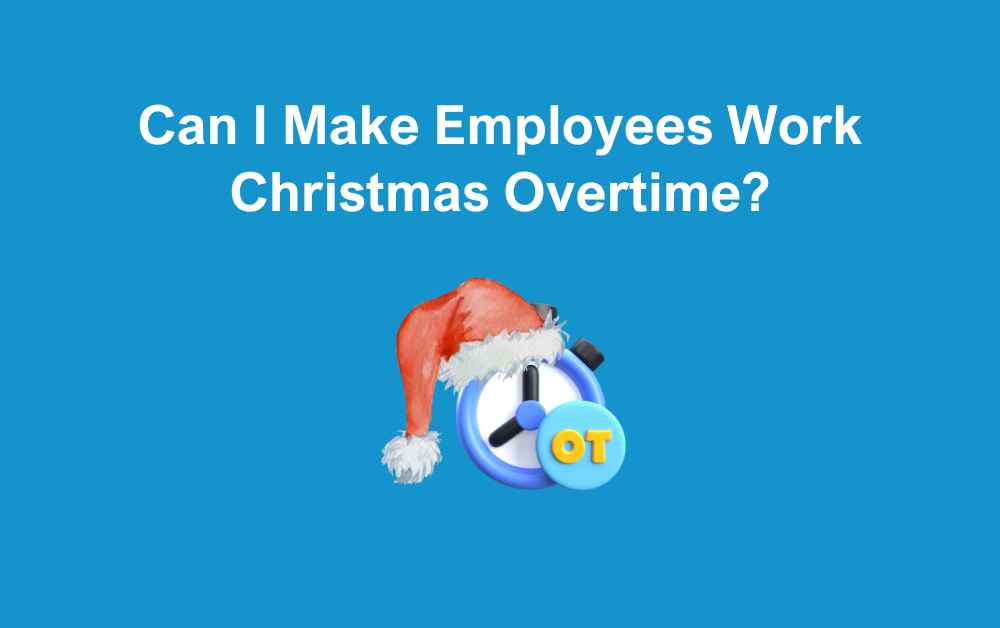The festive season is a busy time for many businesses, and employers often find themselves needing extra hands to meet demand. A common question arises: Can I make employees work Christmas overtime during the festive period? Understanding your legal responsibilities and maintaining employee satisfaction is key to navigating this seasonal challenge.
Can You Require Employees to Work Overtime at Christmas?
Yes, employers can require employees to work overtime during the Christmas period, but this depends on the terms of their contract. Most employment contracts include clauses about overtime or flexibility during peak times. If this clause is in place, you can request employees to work additional hours.
However, it’s important to consider:
- Notice Period: Give employees adequate notice about any overtime requirements.
- Reasonableness: Ensure the Christmas overtime request is reasonable, keeping in mind the employee’s rights and wellbeing.
- Holiday Entitlements: Employees may have pre-booked holiday leave during Christmas, which you’ll need to honour unless agreed otherwise.
What Happens if There Is No Overtime Clause in the Contract?
If an employment contract does not mention overtime, you cannot enforce it. You may discuss overtime arrangements with employees and offer incentives to encourage voluntary participation. Open communication and flexibility can go a long way in maintaining morale during the busy Christmas season.
Employee Wellbeing and Work Life Balance
In recent years, there has been a well-deserved emphasis on promoting work-life balance and supporting mental health in the workplace. As such, employers must carefully consider the social and ethical implications of requiring employees to work Christmas overtime. While some employees may rely on the opportunity to earn extra income, particularly if it has been a tradition in past years, others may find overtime demands a source of stress and disruption, especially during a season traditionally associated with family and rest.
A significant challenge arises for working parents during the festive period. With schools closed for the holidays, many parents face difficulties securing suitable childcare, making it harder for them to commit to overtime. A rigid policy requiring all employees to work overtime could unintentionally disadvantage parents, potentially opening the door to claims of indirect discrimination. Employers should be particularly mindful of this and explore ways to accommodate these challenges wherever possible.
Employers insisting on mandatory Christmas overtime must be confident in demonstrating that the decision is justified by clear business needs and that no less discriminatory alternatives could reasonably achieve the same objectives. To mitigate these risks, it is best practice to offer overtime on a voluntary basis rather than mandating it. Moreover, employers should ensure that the opportunity to work overtime is distributed fairly among all employees to avoid any perception of bias or unfair treatment.
Religion and Belief
Religious considerations can also come into play during the Christmas season. For many, Christmas is a significant religious occasion, and they may prefer not to work during this time to observe personal or family traditions. On the other hand, employees who do not celebrate may be more than willing to work Christmas overtime and appreciate the chance to earn additional pay during this period.
It is essential for employers to avoid making assumptions about their employees’ preferences based on religion or beliefs. Open communication is key; employers should encourage staff to share their availability and preferences regarding overtime during the festive season.
Where possible, offering Christmas overtime rather than requiring it is again the best approach. This ensures that individuals can make their own decisions about their work commitments during this time, reducing the risk of inadvertently causing offence or dissatisfaction.
Striking the Right Balance
By considering family-friendly policies and respecting employees’ diverse beliefs, employers can foster a positive working environment during the Christmas season. Offering flexibility, engaging in transparent communication, and respecting employees’ circumstances will not only help avoid potential legal and ethical pitfalls but also improve employee morale and productivity during this crucial time for many businesses.
Do I Have to Pay Employees Extra for Working Over Christmas?
There’s no legal obligation in the UK to pay employees extra for working on Christmas Day, public holidays, or overtime, unless specified in their contract. Here’s what to keep in mind:
- Check the Employment Contract: Some contracts may include a higher rate of pay for overtime or work on bank holidays, including Christmas.
- Incentives for Morale: While not legally required, offering additional pay, time off in lieu (TOIL), or bonuses can boost employee satisfaction and make the request for Christmas overtime more acceptable.
How Does This Impact Seasonal or Part-Time Workers Who Work Overtime?
Part-time and seasonal workers are entitled to holiday pay that accurately reflects their average earnings, including overtime, just like full-time employees. If these workers have consistently and regularly worked overtime, their holiday pay must factor in these additional hours.
To calculate holiday pay for such workers, employers must use the same 52-week average method applied to full-time staff. This ensures that holiday pay represents the worker’s typical earnings, providing fair compensation regardless of their employment status or work schedule.
Best Practices for Managing Christmas Overtime
Managing Christmas overtime can be a balancing act. Follow these tips to ensure a smooth process:
- Plan Ahead: Forecast your staffing needs early and communicate expectations to employees in advance.
- Be Fair and Transparent: Offer overtime opportunities equitably and explain the business reasons behind the need.
- Consider Employee Preferences: Acknowledge family commitments and provide as much flexibility as possible.
- Offer Incentives: If your budget allows, consider paying extra or providing perks to employees working overtime during the Christmas period.
- Respect Employment Laws: Adhere to working time regulations, ensuring employees do not exceed the legal working hour limits.
Final Thoughts
While employers can require Christmas overtime under certain conditions, it’s crucial to approach this with clear communication and fairness. Checking employment contracts and offering incentives can make the process smoother for everyone involved. Remember, while you may not be obligated to pay extra for Christmas work, showing appreciation for employees’ efforts can boost morale and productivity during this busy season.
By planning effectively and maintaining a positive work environment, you can ensure your business thrives while keeping employees happy and engaged during the Christmas period. We’ve also written guidance on ”do I have to pay employees a Christmas bonus”. You can read the full article on our website.
Need advice on managing Christmas overtime? Contact us at The HR Booth for tailored HR support.







